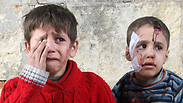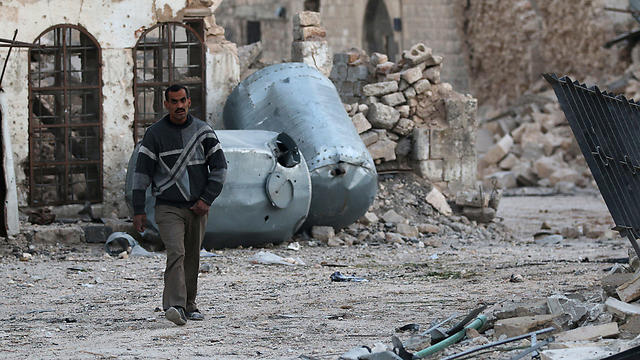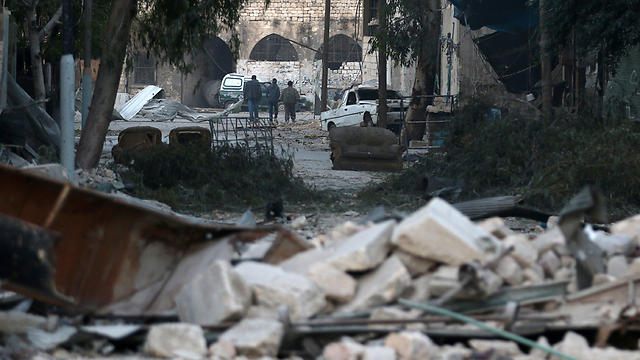
Syrian forces used chemical weapons in final push for Aleppo
Syrian government forces executed at least eight chemical attacks during the final weeks of the battle for Aleppo, killing nine and injuring hundreds more
The rights group said it interviewed witnesses, collected photos and reviewed video footage indicating that chlorine bombs were dropped from government helicopters during the offensive from November 17 to December 13.
Around 200 people were injured by the toxic gases used on opposition-controlled areas of the northern city, according to HRW.
One of the deadliest bombings hit the neighborhood of Sakhur on November 20, killing six members of the same family including four children whose lifeless bodies were shown on a video taken by the Shabha press agency.
The report detailed attacks on a playground, clinics, residential streets, and houses that left scores of people struggling to breathe, vomiting and unconscious.
"The chemicals would affect the children most severely... they inhale these smells and they end up suffocating," said a first responder quoted in the report.
The attacks, which may have involved as many as three helicopters operating jointly, took place in areas where government forces were poised to advance, said the rights group.
"The pattern of the chlorine attacks shows that they were coordinated with the overall military strategy for retaking Aleppo, not the work of a few rogue elements," said Ole Solvang, HRW's deputy emergencies director.
For five of the attacks, HRW reviewed photographs or video footage of remnants of at least seven yellow cylinders that carried warnings that they contained gas.
The actual number of chemical attacks could be higher, said the group, adding that journalists, medical personnel and other credible sources had reported at least 12 attacks in that period.
HRW was able to verify eight attacks involving chlorine bombs.
No evidence of Russian role
Syrian forces, backed by Russia, launched an offensive in November to seize east Aleppo, a key battleground in Syria's nearly six-year war, and the regime announced on December 22 that it had taken full control of the city.
The group said there was no evidence that Russia was directly involved in the chemical attacks, although Russian aircraft did play a role in the military offensive against opposition fighters in east Aleppo.
"We don't have any evidence that Russia was directly involved in any of these attacks or that it was aware", said Louis Charbonneau, HRW's UN director.
"What we do know is that Russia is a close military ally of the Syrian government. It is involved on the ground. It was involved in the battle for Aleppo."
"At the very least, they needed to take measures to ensure that these weapons were not being used," Charbonneau told a news conference.
Chlorine use as a weapon is banned under the Chemical Weapons Convention, which Syria joined in 2013 under pressure from Russia.
The use of chlorine bombs as an indiscriminate weapon could amount to war crimes.
Human Rights Watch urged the Security Council to impose sanctions on senior leaders in the chain of command, but such a move would likely be vetoed by Russia.
France and Britain are pushing the Security Council to ban the sale of helicopters to Syria and impose the first UN sanctions against Syrian military leaders and entities tied to chemical weapons development.
A joint investigation by the United Nations and the Organization for the Prohibition of Chemical Weapons (OPCW) found that several units of the Syrian army had used toxic weapons against three villages in northern Syria in 2014 and 2015.
It was the first time an international probe blamed President Bashar Al-Assad's forces after years of denial from Damascus.
Russia, however, has cast doubt of the panel's findings, saying there were not strong enough to warrant sanctions.
A new report by the UN-OPCW joint investigative panel is expected to be released later this month. HRW has sent its findings to the panel.












